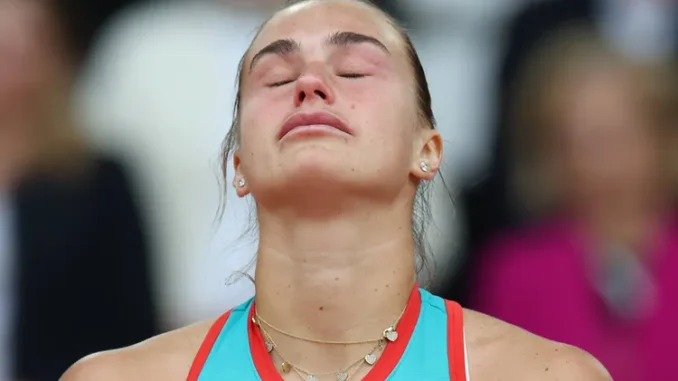
The 2025 French Open women’s final on June 7, 2025, delivered more than just a thrilling showdown between Coco Gauff and Aryna Sabalenka; it sparked a heated debate that has reverberated through the tennis world. Gauff, the 21-year-old American sensation, battled back from a set down to defeat the world No. 1 Sabalenka 6-7(5), 6-2, 6-4, claiming her second Grand Slam title and her first on the clay of Roland Garros. However, the post-match narrative shifted from Gauff’s triumph to Sabalenka’s controversial remarks, prompting tennis legend Jimmy Connors to call for a significant reform in how Grand Slam tournaments handle players’ emotional moments.
Sabalenka, visibly distraught after her defeat, described the match as “the worst final I ever played,” lamenting her 70 unforced errors and the windy conditions that plagued the open-roofed Court Philippe-Chatrier. “This one hurts so much, especially after such a tough two weeks, playing great tennis,” she said in her runner-up speech, her voice heavy with emotion. In her press conference, she doubled down, suggesting that Gauff’s victory stemmed from her own mistakes rather than exceptional play, and even claimed that Iga Swiatek, whom she defeated in the semifinals, would have beaten Gauff had she reached the final. “I think she won the match not because she played incredible, just because I made all of those mistakes,” Sabalenka stated, sparking a firestorm of criticism from fans and former players alike.
The backlash was swift, with tennis icon Chris Evert defending Gauff. “When you heard Aryna say it was the worst [final], I was like wow!” Evert remarked. “It’s the same on both sides. You have to make that adjustment. If you are number one in the world, you should know how to play on windy days by now.” Gauff, ever gracious, responded with poise on *Good Morning America*, saying, “I was a little bit surprised about the comments and everything, but I’m gonna give her the benefit of the doubt. I’m sure it was an emotional day, emotional match.” She also rejected Sabalenka’s claim about Swiatek, noting, “No shade to Iga or anything, but last time I played her, I won in straight sets. I don’t think that’s a fair thing to say because anything can really happen.”
Enter Jimmy Connors, the eight-time Grand Slam champion, who offered a passionate defense of Sabalenka on his podcast, *Advantage Connors*. Drawing from his own experience as a runner-up in seven major finals, Connors argued that the immediate post-match interviews and press conferences place undue pressure on players. “After a tough match, whether it’s the finals or the French or Wimbledon or whatever, everyone wants to hear your thoughts right away,” he said. “Maybe it would be better to give you five minutes and let the players take a breath.” Connors criticized the rush to judgment, adding, “These guys think they know what they are talking about when they have not done it. You don’t know what’s in my mind! You have no clue. And by the way, not every player has the same thing going through their mind, everybody is an individual.”
Connors’ proposed reform—a brief cooling-off period before players face the media—aims to protect athletes from the emotional crucible of defeat. Sabalenka, who has now lost three Grand Slam finals, including the 2023 US Open to Gauff and the 2025 Australian Open to Madison Keys, later clarified her remarks on Instagram. “Yesterday was a tough one. Coco handled the conditions much better than I did and fully deserved the win,” she wrote. “She was the better player yesterday, and I want to give her the credit she earned.” This apology quelled some of the controversy, but Connors’ point resonated: players need space to process their emotions before facing scrutiny.
Gauff’s victory, her 10th career title and a historic moment as the first American woman to win the French Open since Serena Williams in 2015, showcased her resilience. “When I stepped on the court, I was aware of the wind,” she said. “I knew it was gonna be an ugly win.” Her ability to adapt, contrasted with Sabalenka’s frustration, highlighted their differing approaches. As both players gear up for the Berlin Open and Wimbledon, where Sabalenka is the top seed, their rivalry—marked by intense three-set battles—promises more drama. Connors’ call for reform, however, may spark a broader conversation about balancing the sport’s emotional intensity with its demands for instant reactions, ensuring players like Sabalenka and Gauff can shine without the weight of immediate judgment.
Leave a Reply